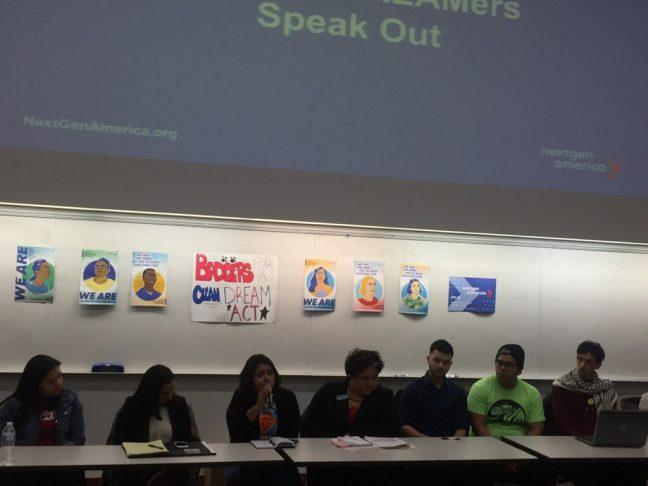Activists and recipients of the Deferred Action for Childhood Arrivals discussed immigration policies and the issues facing undocumented students in Madison at a panel hosted by University of Wisconsin’s NextGen chapter Tuesday evening.
Legislators introduced the Development, Relief and Education for Alien Minors Act in 2001, but panelist and attorney for the Community Immigration Law Center Aissa Olivarez said even 18 years later undocumented youth still do not have a permanent fix. There are 8,000 DACA recipients in Wisconsin whose futures are left undetermined because of prolonged immigration debates.
The highly debated DREAM act would provide a path to citizenship for undocumented youth that DACA does not guarantee, Olivarez said. DACA was originally put in place to shield DREAMers from deportation, but the panelists agreed a more permanent solution is necessary — something the DREAM act would offer.
UW junior Karen Perez-Wilson agreed with the other panelists that a more permanent solution is needed.
“Although DACA created some sense of security and some protection from deportation, DACA was always just a band-aid on the real issue of immigration,” Perez-Wilson said.
The panelists also discussed another factor that worries undocumented youth — tuition. Undocumented students in Wisconsin pay tuition at out-of-state rates, and Perez-Wilson — like other undocumented youth — often found it difficult to pay for schooling.
Rep. JoCasta Zamarripa, D-Milwaukee, advocated for what she called “Wisconsin’s own little DREAM Act.” Assembly Bill 645, otherwise referred to as Tuition Equity Bill, would allow undocumented youth to pay in-state tuition rates to attend UW schools and technical colleges.
“Even in-state tuition is expensive,” Zamarripa said. “But you can imagine how much further that dream of a higher education is if you can’t access in-state tuition rates in the state that you’ve resided in for years.”
Zamarripa is in her fourth term now, but the bill still has not passed through the majority Republican Wisconsin legislature.
Although a Republican has never cosponsored the bill, Zamarripa said universities still hold the power to allow students to pay in-state rates on a case-by-case basis. But without a bill, this opportunity is reserved only for a select few.
“I know that our communities will continue to fight until we get a permanent solution that won’t exclude people,” Perez-Wilson said. “We need something that is inclusive of all our immigrant population.”


